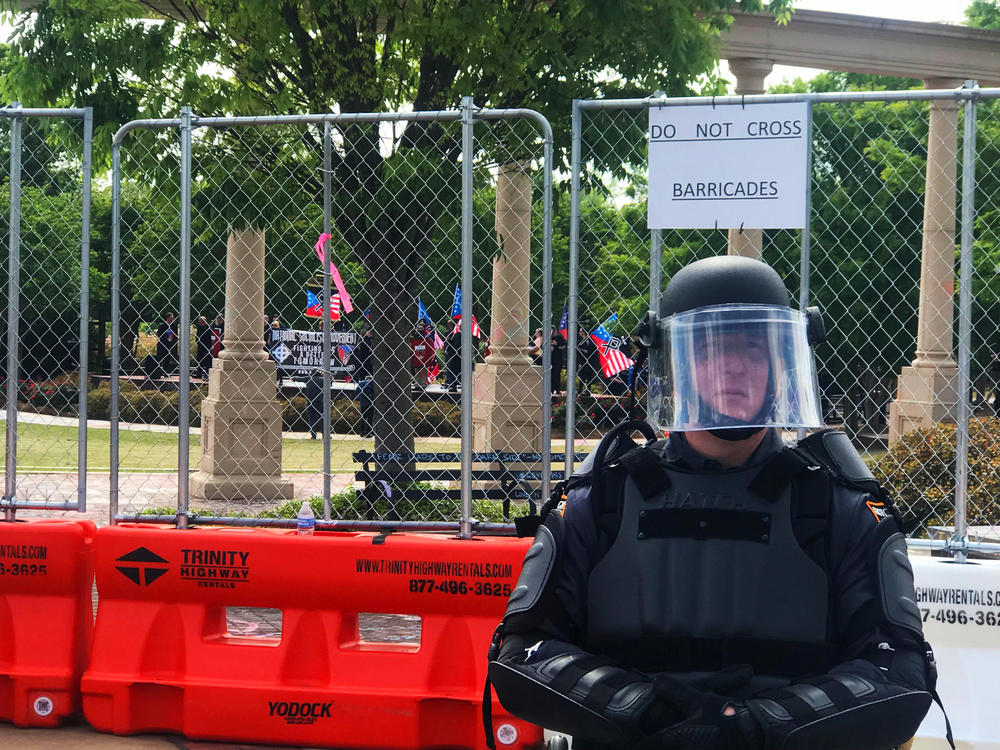Section Branding
Header Content
The Costs Of Free Speech
Primary Content
In April three dozen members of a neo-Nazi group rallied in Newnan, south of Atlanta. Hundreds showed up to counter protest. Police report no one was injured, but the day raised questions about who pays for free speech when it endangers public safety. Local governments spent more than $200,000 to keep the peace.Emily Cureton reports.
It all started with a run-of-the mill city permit, plus $50 for a security deposit. Same as you’d pay to have a family reunion in Newnan’s Greenville Park. But this was no barbecue. It was a spectacle like nothing Stan Herring’s ever seen in his town. And he’s seen a lot in 60 years.
"The [Ku Klux] Klan have always tried to come in, but they always throw them on the outskirts of town somewhere." he said. "But, this is big, this is real."
On April 21, The National Socialist Movement got a permit to rally in the middle of Newnan. The group timed its annual meeting with Hitler's birthday, and used a swastika in its logo design until recently. It's considered a hate group by the The Southern Poverty Law Center.
Herring stood by the car wash he runs on the main drag. And everywhere he turned: police officers, barricades, helicopters and armored convoys.
In all, about 700 people in uniforms turned Newnan into a militarized zone. The city and Coweta County spent more on overtime wages, supplies and food, than the city budgets for an entire year to pave and repair its streets.
Stan Herring was disgusted: "A $50 permit? To put all these people at risk and then spend hundreds of thousands of dollars of taxpayer money in this town to support all that. I don’t feel comfortable with all that."
But Newnan’s leaders say it had no choice but to allow a controversial group to use the park, and to foot the bill. Eugene Volokh agrees. He teaches 1st amendment law at UCLA.
"They could be racist, they could be communist, they could express whatever views they want. You can’t restrict them. You can't charge them more because of their views even if it's based on a good faith judgment that it will require a lot of police protection," Volokh said.
This goes for the entire country, but the battle to decide the law was born in Georgia. Thirty years ago, Forsyth County tried to charge groups deemed more likely to cause trouble more for a permit. A group of white supremacists challenged that, and the U.S. Supreme Court ruled in their favor.
But earlier this year demonstrators at the state capitol in Atlanta were asked to pay security costs associated with the March For Our Lives. About 30,000 people descended on the capitol to call for gun reform. And as a condition of that permit, the Georgia Department of Public Safety billed organizers early $7,000 for overtime costs.
Volokh says that's because state capitols aren’t the same as spaces like sidewalks, or Newnan’s city park. Georgia seems to be leading the nation on testing more limits on access to state property traditionally used for free speech.
Steve Stancil of the Georgia Building Authority, which manages Liberty Plaza and capitol grounds, told CBS 46:
"If there’s going to be an event after hours, then there needs to be a sponsor by a constitutional officer, and they have to pay for additional security."
Getting a constitutional officer meant that to hold a rally on a weekend, you needed permission from one of seven elected officials---all of whom are currently Republicans. But then, a Democratic lawmaker and an organizer of the march threatened a lawsuit.The state backed down and stopped enforcing the rule.
Another legal battle over free speech is rising in the south though, and some of the players were in Newnan.
At that rally, NSM Leader Jeff Schoep said "thanks to the city of Newnan, Georgia for having us here today." Schoep is named in a lawsuit accusing 25 individuals and extremist groups of conspiring to plan, promote and carry out the violence in Charlottesville, Virginia last year. Three people died and 19 were injured.
The lawsuit hinges on who’s accountable when words lead to violence.

